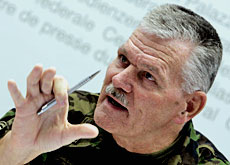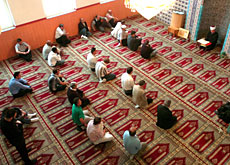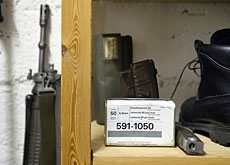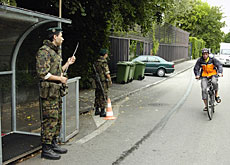Army chief says road to reform bumpy

The head of the armed forces, Christophe Keckeis, has had to deal with a number of thorny issues in the three years he has been pushing through army reforms.
Keckeis tells swissinfo these include peacekeeping missions abroad, which have been criticised by the political right, and the controversy over soldiers keeping their weapons at home, opposed by the left.
As he prepares to retire, Keckeis points out that peacekeeping missions are clearly anchored in the Swiss constitution, while keeping a weapon at home is a question of trust.
swissinfo: As someone in the spotlight you stand for values like discipline and determination. As head of the army, do you also have doubts?
Christophe Keckeis: There are a number of issues that are highly complex. That means there are doubts but the head of the army cannot afford not to respond to them.
I have to make decisions very objectively. It goes without saying that emotions and soft factors also play a role, but when it comes to decisions, they are tackled and solved factually and thoroughly.
swissinfo: Which is the greater challenge – dealing with criticism from the left or attacks from nostalgic officers and rightist patriots?
C.K.: I take both very seriously. Both are part and parcel of our democracy. I have more difficulty finding the right argument to counter those on the right because this criticism is completely new.
It used to be easy to deal with leftwing anti-army ideology since it was very straightforward. The left was – with a few nuances – fundamentally opposed to the army.
But the military has changed so dramatically that the right and those nostalgic for the way it used to be have a tough time [accepting the changes]. That worries me.
swissinfo: So-called patriots protest when it becomes public knowledge that the army leadership is considering sending soldiers into a conflict zone. Do you have any room for manoeuvre when it comes to participation in international peacekeeping missions?
C.K.: I’m convinced that we do have room but it is difficult to develop. Foreign missions are clearly part of the mandate outlined in the constitution. The United Nations is counting on us, we will receive requests [to participate] and this will become more of a trend.
But I sense that the Swiss have not yet found the beat. I think it will take another two or three generations before we do. Our military traditions are so robust that it will take years before people are convinced. It’s a typical Swiss story. But we do have room for manoeuvre. In 20 years, we’ll be where others are today.
swissinfo: Keeping guns and ammunition at home: This is a Swiss tradition. But parliament recently voted to stop the practice, saying the ammunition should be stored in armouries. How do you deal with that?
C.K.: It’s a very topical and difficult subject. We have to accept that the Swiss parliament will take the soldiers’ ammunition away. That’s the primacy of politics and we are now at the stage of implementing this decision.
But it will be very difficult when it comes to guns. I receive a lot of feedback from soldiers who feel the loss of their weapon means they are no longer trusted. That would be fatal.
Soldiers today feel they have confidence placed in them since they receive guns and weapons’ training. But we will have a huge problem if it ever comes to the point that soldiers are required to give up their weapons. I can imagine that a lot of citizens would not go along with the order.
It’s incredible how this topic has dominated politics. Objectively, the withdrawal of ammunition should not be an issue for a militia army. It has a very intimate dimension which is the fundamental trust in a militia soldier.

More
Militia army
swissinfo: Who is the enemy?
C.K.: Terrorism is unfortunately the number one threat worldwide. Switzerland is exposed – like every other nation in the western world. Secondly, it’s organised crime and weapons of mass destruction, which also circulate here.
There is a very low probability that Switzerland would be the victim of military aggression. We can reduce the quantity [of soldiers and equipment] while ensuring the quality remains high so we can meet the challenges.
swissinfo: Terrorist attacks are obviously difficult to predict. Can a militia army counter such threats?
C.K.: It’s possible to provide a proper response with a militia army. The most important duties connected with terrorism are ensuring security on the ground and in the air. Part of the army – made up of professional soldiers – is responsible for sovereignty of the air space. And every day hundreds of soldiers are required to protect embassies and consulates since the police are no longer able to carry out this task.
A new element of the reformed army is the soldier who has chosen to serve his stint in one long stretch. That means we have hundreds of well-trained soldiers who can be sent to the right place in a matter of hours.
swissinfo: You are stepping down in a few weeks. Can you imagine life without a uniform?
C.K.: Unfortunately, I’ve been so busy I haven’t had time to think about it, but I’ll certainly adapt. My wife is at the moment organising trips for us so we can make up for what we’ve missed over the past 42 years.
I removed my name from the list of fighter pilots years ago, but have lived out my passion for flying as an aircraft and glider instructor. I’ll spend more time after my retirement flying and teaching new blood.
I will certainly give careful consideration to all of the commissions which come my way and choose those which best suit my character and ethics.
swissinfo: A book about you, in particular about the way it has been financed, has caused a sensation. In response, defence minister Samuel Schmid has decided that taxpayers’ money cannot be used. What is your reaction?
C.K.: The book has not yet been released for publication and only a few people have read it so far. But before there was a discussion about its contents, it was put in a negative light because of the way it was being financed.
It’s not only a book about me but also about the new Swiss military. That’s why the editor intended to have the army pay to have a copy distributed to all officers down to the level of major. But we will implement minister Schmid’s decision and not use taxpayers’ money.
swissinfo-interview: Andreas Keiser
Born in Neuchâtel in 1945.
Joined the airforce and was a professional military pilot from 1968.
Graduated with a degree in political science from Lausanne University in 1976.
Between 1985 and 1992, Keckeis was a test pilot for new fighter jets.
He was appointed head of the armed forces in 2004.
Keckeis will retire on January 1, 2008.
The book, Christophe Keckeis – the future of the Swiss army, was conceived as a retirement gift for the armed forces chief.
It was written by the head of the communications department of the army along with an independent journalist.
Parliamentarians criticised the book earlier this month after it was discovered that SFr100,000 ($91,000) of taxpayers’ money would be used to pay for thousands of copies for officers and government staff.
Defence minister Samuel Schmid ruled on November 21 that no public money was to be used.
The idea to distribute the book at no cost was subsequently dropped.

In compliance with the JTI standards
More: SWI swissinfo.ch certified by the Journalism Trust Initiative



You can find an overview of ongoing debates with our journalists here . Please join us!
If you want to start a conversation about a topic raised in this article or want to report factual errors, email us at english@swissinfo.ch.